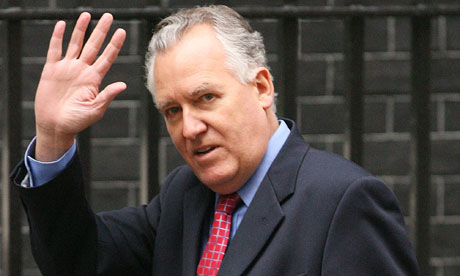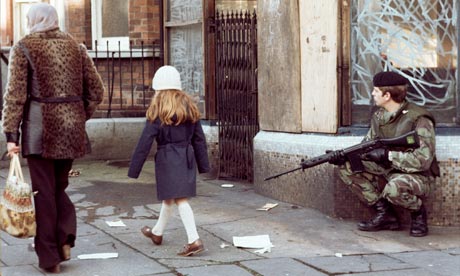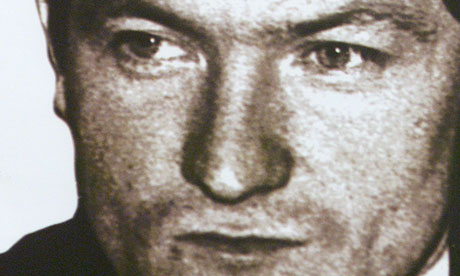By HARRY BROWNE
Editors' Note: On Thursday, May 29, elections to the Northern Ireland Assembly should have taken place. However, earlier this month Tony Blair decided to postpone the elections because, he said, of the failure of the IRA to come up with a statement that declared an end to all paramilitary activity. He said it would be pointless to go ahead with elections to an Assembly that was incapable of forming a power-sharing government. Many people in Ireland believed the decision was coloured by the likely 'centre cannot hold' outcome of the election: gains for Sinn Fein and Ian Paisley's DUP, and further damage to former 'First Minister' David Trimble from uncompromising elements in his own UUP. (Is this a preview of 'democracy' in Iraq?) At present Northern Ireland is again being ruled directly by British ministers, to the consternation mainly of the local politicians missing out on salaries and limousines. Harry Browne visited Belfast, where the talk is not of elections but of informers. AC/JSC
Belfast.
The 'war on terrorism'? Northern Ireland knows something about that particular concept, and is learning more and more about how easily 'on' mutates into 'of'.
The other day an apologist for the security forces said on radio what a tough job cops and soldiers had, working through all the years of the Troubles to "control terrorists". Someone pointed out to him just how terribly apt that verb, 'control', had turned out to be..
It would be unfair to say that Belfast is reeling from the news that the British Army had a highly placed informer in the IRA. "If you had asked me 10 years ago if there were informers, I would have said 'of course there are'," one senior republican told me in a Falls Road coffee-shop. "And the Brits were hardly going to bother putting them in black taxis."
So Sinn Fein tries to wax philosophical and even 'optimistical' -- the same republican insisted that the revelations were simply a sign of the British security apparatus disintegrating sloppily in the post-war context, and said they were not affecting morale locally. In public the party even tries to throw a veil of doubt over the particular claim that Freddie Scappaticci, formerly a central figure in the IRA's 'internal security' unit, was 'Stakeknife', a key British agent.
Scappaticci is one of hundreds of people of Italian descent in Northern Ireland and one of several of them known to have been involved with the IRA. Second generation, Belfast-accented and unable to speak Italian, he insists he was not baptised 'Alfredo' and resents the media for making Mafia noises with his name. On May 15 he made a monkey of those mediosi who had been reporting he was in hiding in Britain, when he appeared at a Belfast press conference to deny that he was Stakeknife. Since then, he has given a long interview with a local republican-leaning paper, the Andersonstown News, painting a fuller picture of himself as a granddad with a bad back just trying to get on with his life.
Be that as it may, most people here believe he was indeed Stakeknife, and that now he is 'toughing it out' because he has done a deal with the IRA. The IRA, observers suggest, could not afford the political fallout of such an obvious ceasefire-breach as the murder of Scappaticci, and so is playing along with his story in the hopes that the confusion and finger-pointing does more to embarrass the state than to divide the republican movement.
That remains to be seen.
The British state may be beyond shame in the wake of the report by English cop John Stevens into its widespread collusion with and manipulation of loyalist terrorists, especially in the Ulster Defence Association (UDA) -- watch out for some intriguing prosecutions -- but there's little doubt that the publicity about Stakeknife has opened up old internecine furies between different elements of that state.
One feature of the subsequent media frenzy has been the way army and police sources have been taking turns to claim that their agents had better information, more clout and/or cleaner hands than the other guys'.
Even before the Stakeknife revelations, investigative journalists at Phoenix magazine had discerned the battle lines: "the Foreign Office, supported by MI6 (the Secret Intelligence Service), the SAS, and the PSNI [formerly RUC] intelligence section plus ODSC (ordinary decent service cops) versus MI5 (the security service) and the Defence Intelligence Staff, which controls the various military intelligence groups."
Stakeknife belonged to army intelligence (the original information about him came, it seems, from a disaffected army source, which adds another twist to the spin, as it were) and his hands are filthy: some reports link him to 40 killings.
His IRA 'internal security' role meant he knew a great deal about the work and identities of his colleagues; ironically, he was involved in investigating and killing alleged informers, putting him in a useful position to direct speculation away from himself.
His army 'handlers' not only let him go on killing, but on one occasion apparently protected him from loyalist assassination by redirecting a UDA murder squad to another man of Italian descent, Francisco Notarantonio, a senior citizen who had abandoned republican paramilitarism long before.
Still, Fred Scappaticci was not a key player in the Sinn Fein 'peace strategy', something conspiracy theorists, out in full force since the codename first began to circulate publicly a few years ago, have reckoned Stakeknife must have been.
Writer Danny Morrison, no longer a Sinn Fein official but still 'republican-minded', claims Scappaticci was one of three people under suspicion for leaking details that led to Morrison's own arrest in what appeared to be an IRA 'kangaroo court' in 1990; and so 'Scap' was kept away from sensitive information and operations after that date.
This is somewhat contradicted by another ex-agent who claims he was interrogated by 'internal security' in the form of Scappaticci in 1994 after an IRA operation went wrong. On the other hand, a newspaper report that he was also more recently providing information to the US DEA about 'narco-terrorism' links between the IRA and the Colombian FARC is probably just so much hyped-up spy-spin.
Efforts to dull the edge of the Stakeknife story won't stop the speculation in republican areas that some sort of cooperation with Britain ran to the very top of the Sinn Fein/IRA organisation.
For some dissidents, the presence of one or more 'touts' at a high political level is all that can explain the movement's abandonment of 'armed struggle' with a settlement that falls so far short of traditional objectives, however 'transitional' Gerry Adams says it is.
If the current clatter of skeletons tumbling from closets is bad for the Provos, it should be worse for the Brits.
It is increasingly clear that commitment to extra-legal means of fighting the IRA -- commitment, that is, to directing terrorism-- reached to the very top of the British government. Prime minister Margaret Thatcher took a particular interest in Irish 'counter-terror' from her election in 1979, and especially after the bruising hunger strikes in 1980-81. The army's Force Research Unit (FRU), cited by the Stevens Report for its direction of the UDA through agent Brian Nelson (and also the very same spooks who 'ran' Stakeknife) was a pet project of hers; she allegedly met personally and privately with its officers in Northern Ireland.
The longstanding myth of Britain as a neutral party standing between two atavistic Irish factions -- shockingly popular among the Dublin media classes as well as in middle England -- is has taken a lethal hit.
Nonetheless, to some extent all this is water under the bridge.
While most elements of Ulster unionism still have an instinctual aversion to sharing political power with Irish republicans, that aversion is no longer shared by the British government (or, indeed, by the US government). For the British state, a successfully co-opted republican movement constitutes at least as good a 'partner' for governing Northern Ireland as John Hume's once-beloved, now-neglected Social Democratic and Labour Party.
The short-lived Northern Ireland executive included Sinn Fein's Martin McGuinness as education minister, while he was alleged to be still a senior member of the IRA. (Unlike Adams, McGuinness has acknowledged his earlier role in the IRA in his native Derry.) Another Sinn Fein assembly member, Bairbre de Brun, was health minister, and neither she nor McGuinness was notable for the revolutionary overthrow of the bureaucracies they were assigned to oversee.
Nonetheless, there are new tensions that arise with each revelation. Republicans enjoyed only a brief period of "I told you so" over Stevens's report on collusion between the state and loyalists before a Stakeknife was driven into its own community-- whether the code-name refers to one person, a number of people or a whole operation that included electronic surveillance as well as agents.
All over republican areas there are people whose family members were killed as alleged informers; there are others who lost loved-ones in operations that must have been betrayed by highly placed double-agents.
While their discontent bubbles under the surface, the Sinn Fein leadership has to worry. An IRA source told the Sunday Tribune that there was a danger of Scappaticci being killed by the dissident 'Real IRA'; it seems unlikely, given the discomfort his survival causes to their rivals in the Provisionals. (Further danger to Sinn Fein arises because of the terminal-looking tailspin in Northern Ireland's political process; the only way for the Northern parties to pull up and restore devolved government appears to be some sort of potentially humiliating act of disarmament by the IRA.)
For the moment, all the organizations involved are left to conduct the usual round of bureaucratic finger-pointing and ass-covering. University of Ulster sociology professor Bill Rolston is something of an international specialist in how communities and societies unearth the truth after a conflict situation he warns sharply against the idealization of South Africa's Truth and Reconciliation Commission -- and when CounterPunch met him in the Lisburn Road he threw up his hands in despair at the notion that, given the state's interest, its evident capacity for cruelty and its self-protective instincts, an unspun truth about the actions of all combatants in the Troubles can be discerned.
With the official tribunal of inquiry into a single set of events, the 1972 Bloody Sunday killings in Derry, now in its fourth expensive year, it's not surprising that Rolston has written in Race and Class 44: "If a truth commission is open to manipulation by the same state forces that it seeks to bring to task, if trials cans find individuals but not systems guilty, and if tribunals become over-legalized, surely the odds are stacked against the community that is seeking truth." The latest revelations will further demoralize such communities: how much truth can they stand about the duplicitous roles played by some of their own?
Harry Browne lectures in the school of media at Dublin Institute of Technology and writes a weekly column in the Irish Times. He can be reached at



![[Image]](http://cryptome.org/ira-spy-fight-04.jpg)
![[Image]](http://cryptome.org/ira-spy-fight-02.jpg)
![[Image]](http://cryptome.org/ira-spy-fight-03.jpg)


 Former British army intelligence officer Ian Hurst. Picture: Getty
Former British army intelligence officer Ian Hurst. Picture: Getty



